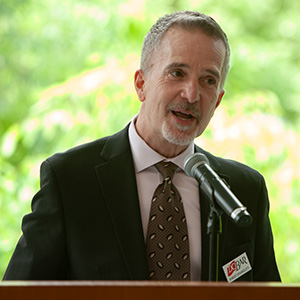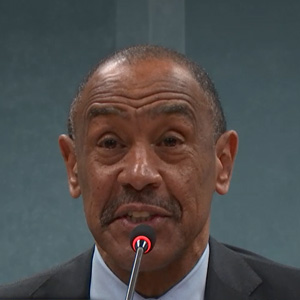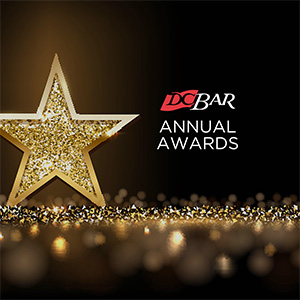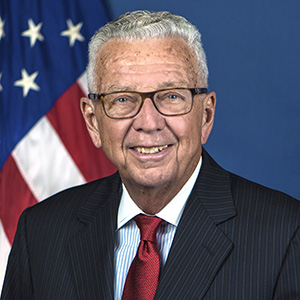Georgetown Law Wins 2024 D.C. Cup Moot Court Competition
February 28, 2024
The winning Georgetown Law team of Juli Dajci (left) and Tyler Viljaste
After three rounds of arguments spanning two weekends, Georgetown University Law Center prevailed over five other law school teams to win the 2024 D.C. Cup Moot Court Competition at the D.C. Court of Appeals on February 23.
The competition brought together some of the brightest minds at the District’s law schools, but Georgetown Law’s 2L students Tyler Viljaste and Juli Dajci clinched victory in the final round against Catholic University of America Columbus School of Law’s Leah Roddenberry and Gerald Sharpe. Sharpe won best oralist, while American University Washington College of Law took home the best brief award.
The teams from Georgetown and Catholic argued a ripped-from-the-headlines case questioning a gun manufacturer’s liability in the wake of a fictional school shooting.
Arguing for the appellant, Viljaste tackled the intellectual and ethical challenges posed by the case, emphasizing the educational value of arguing from both perspectives. “The hardest part of the topic we were mooting was putting aside my own personal biases about the subject and putting on my ‘zealous advocate’ hat for both sides,” Viljaste said. “However, it was a really helpful and educational experience mooting both sides because, in preparing to advocate for either side, you get a better sense of the strengths and weaknesses of both, which you can incorporate into your advocacy no matter who you represent.”
Representing the appellee, Sharpe aimed to balance legal arguments with the gravity of the subject matter. “It was a tough case. Tragedies mean the right people need to be held responsible,” Sharpe said. “I think the law is clear that the defendant in the case wouldn’t be the one responsible, so you try to bring that out in a way that acknowledges the horrifying nature of the crime.”
The hypothetical case also left Sharpe conflicted personally. “I think I keep flip-flopping back and forth. Every time I go up there, I convince myself that I’m right, that my side is right. Maybe that’s a bit of confirmation bias. If you told me to give you my real opinion, it’s a close answer, but that’s what makes it a good moot court problem,” he said.
Roddenberry, representing the appellee with Sharpe, won over the judges with her smooth delivery and strong presence in the courtroom. For her, the best parts of the competition were mastering the control of her tone and approach, as well as effectively representing her client's interests. “My favorite part was learning to persuasively argue in an appellate court,” she said.
For Roddenberry, the most challenging aspect of the case was the tragic harm the appellants suffered due to their children’s deaths. “Especially having to represent the appellee in the final round, I had to strike the perfect balance of showing empathy and respect to the situation while also making strong legal arguments to represent our client,” she said.
The teams argued before Judge Loren L. AliKhan of the U.S. District Court for the District of Columbia, D.C. Solicitor General Caroline Van Zile, and D.C. Bar President Charles R. Lowery Jr.
“I think it gets harder every year. The teams are so excellent,” Van Zile said. “They are amazing this year.”
AliKhan agreed, saying, “[The deciding factor] was razor thin. If we could have awarded a tie, I think we would have.”
Before the winners were announced, the judges provided feedback for each of the team members, starting with the duo from Catholic.
Sharpe, according to the judges, had a natural way of speaking in court, making it feel more like a conversation than a formal courtroom battle. The judges pointed out that he was good at sticking to his main point but also quick to switch gears when needed, showing off advanced lawyering skills that are difficult to master but necessary for working in appellate law.
Roddenberry, on the other hand, commanded the courtroom with her measured pace and commanding presence. Despite a slightly unclear start, she quickly found her footing, presenting her arguments with increasing clarity and impact. The judges said her skillful employment of a hypothetical scenario significantly strengthened her position, drawing a clear distinction between “could” and “would,” which resonated powerfully with the judges, both rhetorically and substantively.
Georgetown’s Dajci began his presentation with an engaging back-and-forth dialogue with the judges, facilitated by the innovative use of a Venn diagram. His conversational approach, combined with the adept handling of the judges’ queries and a structured return to his outline, ensured a comprehensive coverage of his arguments, exemplifying effective courtroom strategy and communication.
Viljaste acknowledged the vulnerabilities in the appellant’s side while maintaining a solid structure in his discourse, continuously referring to his outline. The judges deemed this consistency a strategic triumph. Viljaste’s’ emphasis on federalism and his insightful analysis of Soto v. Bushmaster Firearms, alongside his ability to redirect the discourse favorably when faced with difficult questions, demonstrated a nuanced understanding of legal principles and a remarkable capacity for agile thinking under pressure, the judges said.
When asked how his team prepared for the final round, Dajci said, “We had some really good coaches that helped keep us on track.”
Expressing their gratitude to both their coaches and the D.C. Bar, Dajci and Viljaste said the D.C. Cup Moot Court Competition had been a marvelous experience. “Competing with other students and learning from their styles [helped in] adapting my own styles and own arguments based on the amazing talent at the other school. I think this was a really strong year based on the team we went up against,” said Viljaste.
The competition, organized by the D.C. Bar Communities, is an invitational event for the six law schools located in the District of Columbia. In addition to Georgetown, Catholic, and American, other competing schools were Howard University School of Law, George Washington University Law School, and University of the District of Columbia David A. Clarke School of Law.
“Throughout the competition, I was amazed at how hardworking and talented all the students were,” reflected Pamela Robinson, director of the D.C. Bar Communities. “I think it is safe to say that these future members of the Bar will be wonderful additions to the profession.”
Angela Mackie-Rutledge, a student at George Mason University Antonin Scalia Law School, is a D.C. Bar writer in residence for 2023–2024.





